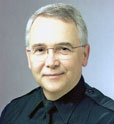The Interview
Steven Staggs
Police Captain (Retired)
See also the instructional video "Traits of a Successful Crime Scene Investigator"

From my experience as both a candidate and as an interviewer I have four main things I think you should do to have a successful interview.
Undoubtedly there will be many individuals who will be interviewed for the job. What you need to do is be memorable. After the interview panel has completed all their interviews and begin to decide on whom to hire, they need to remember who you were. You make yourself memorable by standing out in your interview. Here is how you can stand out:
Be prepared to answer the question: "What do you know about us?"
Learn everything you can about the community and the department you are applying to. Read everything on their web pages. Google search the local newspapers for stories about the department, the types of crime they investigate, and any controversy in the community about the department or their delivery of service. Call the CSI Unit and tell them you are about to be interviewed for the position and ask to talk to someone in the Unit. Find out all you can about the Unit including how many work there, what their duties are, what types of crime scenes they process most, and what issues they are dealing with. Ask a supervisor if you can do a "ride along" to see the unit. Be prepared to tell the interview panel all about the community, the department, the challenges it faces, all about the CSI Unit, what types of crime scenes they process, and tell them that you talked to people in the unit and did a ride along. By doing this the interview panel will know you did your homework by investigating the department and unit. They will know you want the job after checking them out thoroughly.
Answer questions about crime scene investigation techniques.
Agencies are inclined to give jobs to those who have a clear understanding of the job they are applying for, and have done something to prepare themselves for the job. During an interview you can expect to be asked questions about crime scene investigation techniques to see if you really understand the duties of a Crime Scene Investigator.
Watch the instructional videos on this website to have an understanding of crime scene techniques. There are 43 instructional videos on this website with topics that include Crime Scene Investigation and Documentation, Evidence Collection, Latent Fingerprints, Footwear, Tire Track and Other Impressions, Firearms and Tool Mark Evidence, and Crime Scene and Evidence Photography. Mastering these subjects is vital to successful crime scene investigations. Understanding these subjects is vital for landing a job in crime scene investigations.
Show them what you can do.
Have you taken classes in crime scene photography and evidence collection? Take a couple of fingerprint lift cards you have done (your best work) and one or two photographs (a close-up photo of evidence and a painting-with-light photo). When they ask something like "What have you done to prepare yourself for this job?" show them the lift cards and photographs. Explain what they are ("this is a black powdered latent lifted from a coffee mug, this is a painting-with-light photograph, the painting-with-light technique works especially well for documenting large crime scenes at night"). They will see that you have a basic knowledge about the job and that you will be able to do the job. This is also something that probably none of the other candidates will do so it helps you to stand out.
Always have something to say in closing.
They will usually ask one last question during the interview: "Do you have any questions for us, or is there anything you wanted to tell us?" Never say "No." This is where you should tell them you want the job. Sure, you and all the other candidates want the job, but tell them that you have researched the community, the department and the CSI Unit, and that you really want to work for them. Tell them you feel that you can be an effective member of the team.
Of course there are all the other normal things about interviews: Sit up straight, look directly at the person asking the question, speak clearly, dress conservatively, cover any tattoos, no excessive jewelry (especially nose rings, tongue studs, etc.). Leather pants, high heel shoes, low-cut tops and wild hair might look good on TV, but most departments want normal looking people to represent them in the community.
Best wishes on your interview.
About the Author
 For 34 years Steven Staggs was a crime scene investigation and forensic photography instructor and trained more than 4,000 crime scene technicians and investigators for police and sheriff departments, district attorney offices, and federal agencies. He was also a guest speaker for investigator associations, appeared as a crime scene investigation expert on Discovery Channel's Unsolved History, and provided consulting to law enforcement agencies.
For 34 years Steven Staggs was a crime scene investigation and forensic photography instructor and trained more than 4,000 crime scene technicians and investigators for police and sheriff departments, district attorney offices, and federal agencies. He was also a guest speaker for investigator associations, appeared as a crime scene investigation expert on Discovery Channel's Unsolved History, and provided consulting to law enforcement agencies.
Steve has extensive experience in crime scene photography and identification. He has testified in superior court concerning his crime scene, evidence, and autopsy photography and has handled high profile cases including a nationally publicized serial homicide case.
Steve is the author of two books on crime scene and evidence photography, the text book Crime Scene and Evidence Photography and the Crime Scene and Evidence Photographer's Guide. The guide is a field handbook for crime scene and evidence photography, which sold over 10,000 copies and has been in use by investigators in more than 2,000 law enforcement agencies.
Steve retired in 2004 after 32 years in law enforcement, but continued to teach forensic photography and crime scene investigations at a university in Southern California.
Article submitted by the Author
Article posted: June 28, 2011

